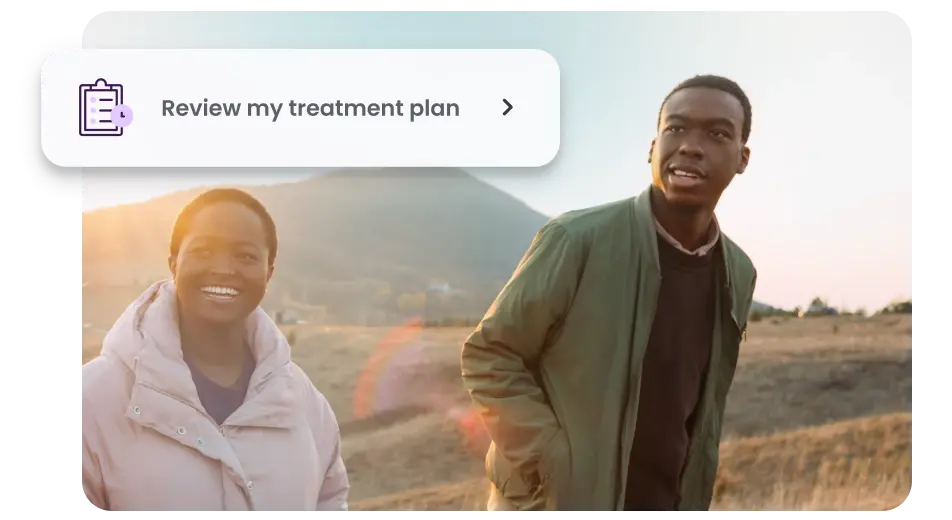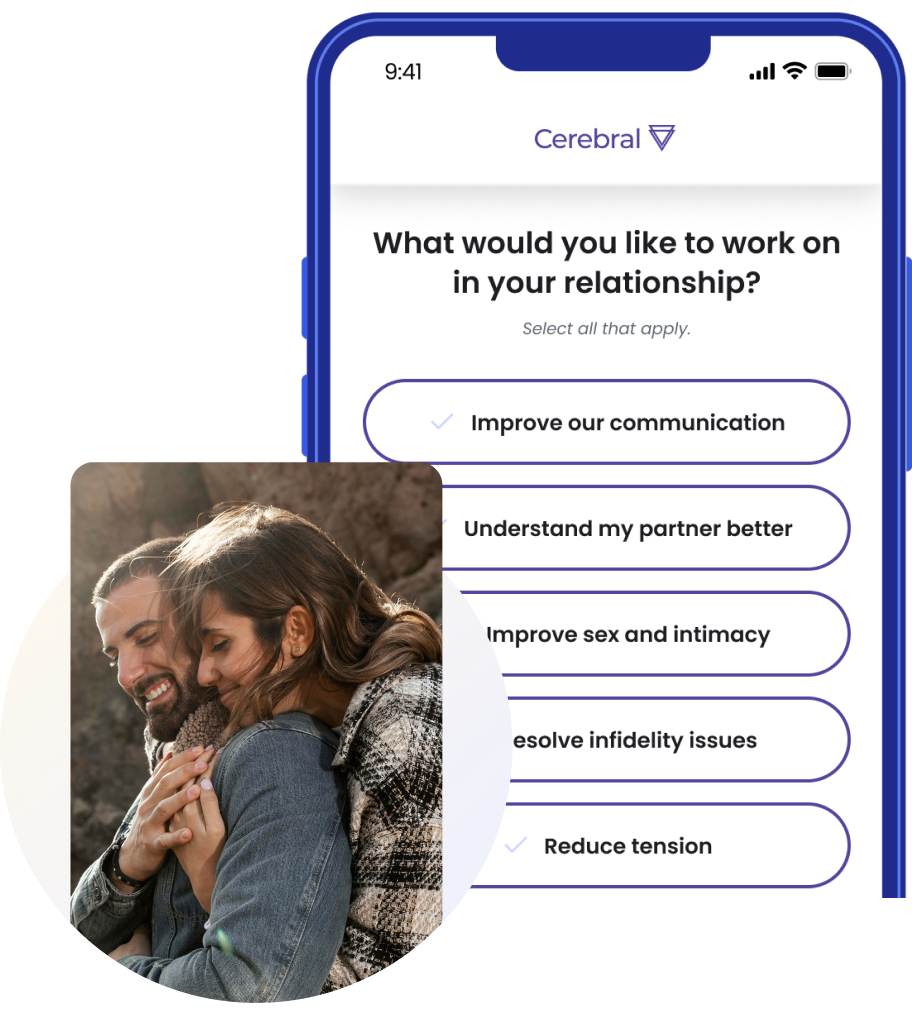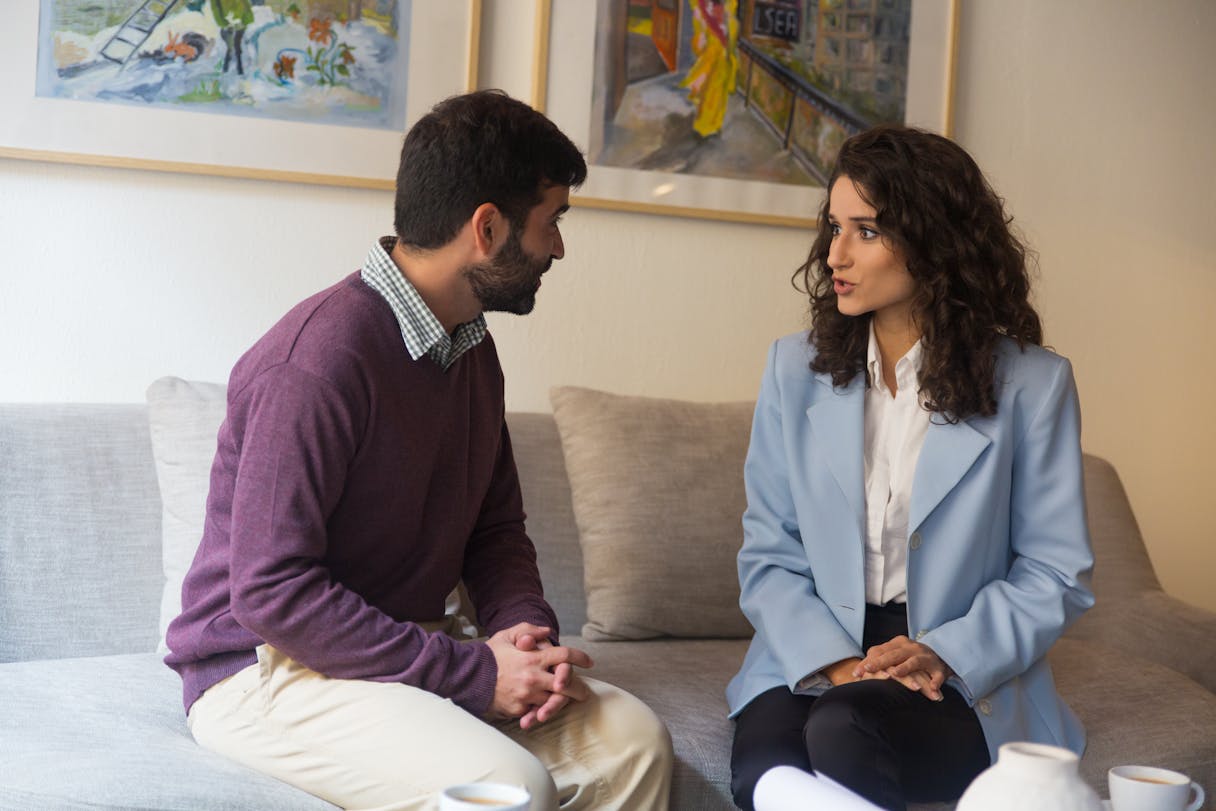Couples Therapy
Support for every relationship — strengthen your bond, navigate life changes, improve communication, and more


Is couples therapy right for me?
Support at any stage
Get support for any relationship status or situation
LGBTQia+ relationships
Safe and judgement-free guidance
Pre-marriage
Learn how to prepare for the next step in your relationship
Married couples
Strengthen your bond, navigate conflict, deepen intimacy
Strengthen any relationship
Therapy can help you and your partner connect and thrive
Resolve Conflicts
Work through disagreements, align on important decisions, and learn how to communicate effectively
Navigate life changes
Get support through major life transitions – finances, relocation, grief, loss, career changes, and more
Parenting and family support
Manage changes like a new baby, pregnancy challenges, an empty nest, or becoming a caregiver
Approaches our therapists use
Emotionally Focused Therapy (EFT)
Short-term therapy that aims to rekindle physical and emotional bonds when couples are feeling distant or disappointed
Integrated Behavioral Couples Therapy (IBCT)
A newer form of therapy that focuses on how acceptance and change can create long-term success in relationships
The Gottman Method
Couples take an assessment to understand the health of the relationship and then work through a plan based on the results

Cerebral vs. In-person couples therapy
We offer more benefits than In-person providersCerebral
In-person
Affordable Pricing
Our services are just as effective and half the cost of most traditional in-person care.
$82/week
$100+/week
Convenient online sessions
Connect when and where it’s easiest for you. Just as effective as in-person care — without the traffic.
Same-week appointments
Booking sessions is easy — and many of our therapists have availability to meet within 48 hours if you need to reschedule.
Between session support
Gain direct access to our support staff, who can help you manage appointments and stay on track with your care.
Switch therapists anytime
If you feel your therapist is not the right match, let us know and we’ll help you select someone new for no added charge.
Sessions and pricing
Our plans are just as effective — and about half the cost — of traditional in-person couples therapy
Navigate your relationship with confidence
Couples Therapy
Weekly 45-minute video sessions with a therapist. A dedicated treatment plan + goal setting
How it works
Most clients are able to meet with a therapist within 3 days of signing up
Create an account
We’ll ask for your name, email, phone number, and some context about your experience with mental health care
Invite your partner
Provide your partner’s information so they can get relevant emails, intake assessments, session reminders, and calendar invites
Choose a clinician + book a session
See all available clinicians in your area, read their bios, view their calendars, and book your first session
Frequently asked questions
You’ll choose a therapist when you sign up as a new client. We’ll show you all available therapists in your area, and you can read their bios and see their schedule. Then you can book your first session at any available time that works for you and your partner.
During your first session your therapist will want to learn more about you and your partner, and your relationship with each other.
As you continue to meet, they will help you and your partner talk through difficult problems, conflicts, and communication barriers — and build long-term strategies to overcome them.
Your therapist will work with both of you to help you understand yourselves and each other, celebrate your strengths and successes, and build a stronger bond with one another.
Every relationship is different, and your therapist will tailor their approach to find the best way to work with you and your partner.
We’ll ask for your partner’s contact information when you sign up. Then we’ll send both of you a welcome email, a confirmation of your first session, and a link to complete an intake assessment before your first session.
We recommend discussing therapy with your partner before you sign up.
Yes, but you should sign up with a different email address than the one you used for couples therapy.
Gmail users who only have one email address:
You can add a 1 to the end of your regular email address when you create an account for our individual services. All communication will be sent to your regular email address.
When choosing a therapist, please be sure to choose one you’re not already working with in couples therapy.
Couples therapy is a new offering, and we’re working on letting users merge their accounts so they can easily access all of our services in one place.
We do not accept insurance for couples services at this time.
You may be able to use your flexible spending account (FSA) or health savings account (HSA) to lower the costs of mental healthcare services. But it’s important to work with your insurer to confirm which expenses are HSA or FSA eligible and what documentation you may need to receive reimbursement.
Couples therapy is for everyone with a partner, whether your relationship is rock strong or you’ve been facing some trials and tribulations. And while you may be up to give couples therapy a try, your partner may need more convincing. Talking to your significant other about couples therapy can be a sensitive and potentially challenging conversation, so we’ve assembled some tips to guide you through the process.
Read more about how to navigate this conversation with you partner here.
There are only a few situations in which couples therapy might not be the right match for you:
- We don’t have available therapists in your state yet
We are constantly adding new therapists to our platform as we expand our couples therapy service - You indicated substance or domestic abuse is present in your relationship
There are more effective options than telehealth can provide in situations where abuse is present. Get more resources [link] - You indicated one or both partners may have severe or persistent mental illness
If one or more partner has an underlying mental health condition, it’s recommended you or your partner take individual steps to manage it before starting couples therapy - Couples therapy has been mandated in court, or you have civil, criminal, or custody legal proceedings in motion.
Telehealth is not a sufficient option for therapy that has been legally mandated
All therapists at Cerebral have a doctoral or master’s graduate degree (PsyD, PhD, MSW, MSEd, etc.) from an accredited institution. Each therapist has their licenses included in their bios, which you can view before you decide to work with them.
Some of these licenses include:
- Licensed Clinical Social Worker (LCSW)
- Licensed Mental Health Counselor (LMHC)
- Licensed Professional Counselor (LPC)
- Licensed Clinical Professional Counselor (LCPC)
- Licensed Marriage and Family Therapist (LMFT)
All therapists maintain or are in the process of obtaining a license to practice in one or more states. Some therapists are licensed at the associate level, which means they are working toward independent licensure under the direction of a professional clinical supervisor.

What To Do If You’re Feeling Underappreciated by Your Partner

How to Talk to Your Partner About Couples Therapy

Here's How Couples Therapy Builds Communication Skills
You deserve a great relationship
If you’re having a mental
health emergency
If you're in emotional distress and
need immediate support
For National Suicide
Prevention Hotline